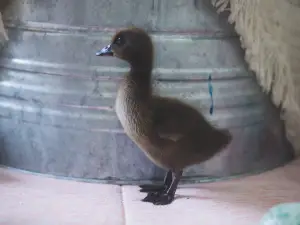
Ducklings are very fragile creatures, a variety of illnesses, conditions and scenarios can kill these animals, one of which is waterlogging.
If you want to know more about what waterlogging is, and how you can help a waterlogged duckling, then read on.
Table of Contents
Waterlogged duckling:
You as a duck raiser need to keep a very close eye on what your duckling is doing and how the health of the bird is. Noticing a change in your duckling in good time may help you save the duck from premature death.
This is what you need to know about waterlogged ducklings:
What does it mean when a duckling is “waterlogged”?
To understand waterlogging you must first know that ducks have oils on their feathers that keep them waterproof. The ducks produce this oil from the preen gland which exists at the base of the bird’s tail.
When a duck preens its feathers with its beak, it spreads this oil from the base of its tail along the length of its feathers.
A very young duckling lacks the oils that make the bird’s feathers waterproof. A mother duck in the wild will rub her own oils onto her ducklings in the first weeks of life and this enables the babies to swim with her.
A duckling raised by humans won’t have a mother duckling to rub her oil on it. If this baby duck swims in water then the duckling’s wings will become soaked with water. This soaked duckling is now “waterlogged”
What causes a duckling to be waterlogged?
A simple swim can cause a duckling to become waterlogged, this is especially true if the bird cannot get out of this body of water. The bird’s feathers will become soaked and the bird can quickly chill and develop hypothermia.
Ducklings don’t have much body fat to keep them warm and if their feathers, the thing that is meant to insulate them, become wet and stay wet then the bird can develop hypothermia and die.
Symptoms of a waterlogged duckling:
Symptoms of waterlogging are easy to see and you can do something about this situation if you see these symptoms. Here are commons symptoms of birds that are waterlogged.
A cold duck: If you touch a duck that is waterlogged the bird will not only be wet but will be cold too, its body temperature is low because of the water on its body:
Soaked wings: A duckling’s feathers are meant to be fluffy and light. If you realize that your duckling’s feathers are soaked with water, heavy and soggy then the bird is likely waterlogged.
Shivering: Shivering may indicate a variety of things in ducks, but this can also mean that the duckling is cold. A cold duckling shivers as a way to get its body temperature up.
Huddled in a ball: This behavior is another way that a duckling will try to warm its body up. If the bird is in a brooder with a heat lamp it may also try to huddle under the lamp to get back warm again.
What to do if your duck is waterlogged:
If you find a waterlogged duckling the first thing that you’d need to do is scoop it up out of the water and hold it trying to warm it up in your hands. Do this while getting the bird inside.
Once inside, hold the bird near a heat source to get the bird to shiver a bit less and get warm.
Run a warm bath for the bird, get the bath temperature around where a duck’s normal body temperature would be. This bath can be in a sink or a bathtub, let the bird swim in it.
The bath should help the bird release any dirt and gunk that may be stuck on its feathers.
Once the bird is done, scoop the bird back up and wrap it in a towel. Keep the bird close to your body to warm up until the bird has completely dried off.
Once the bird is dry you can transfer it back into its brood box. Make sure that the brood box has a heat lamp in it and leave the bird under the heat lamp.
Keep checking on your bird often to make sure that it is fine.
Avoid: Avoid trying to warm the bird up using a hot air blower as this can lead to burns
If you enjoyed this article then you may also be interested in other duck related articles. Here are some articles that you may be interested in: How To Clean Duck Poop From Grass, How To Train Ducks To Go In At Night, Duckling Hatched Too Early, Waterlogged Duckling Symptoms

